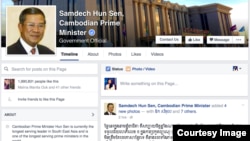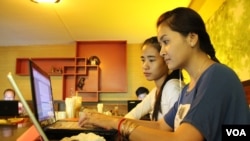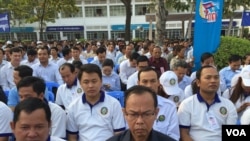On Sunday, Prime Minister Hun Sen had a message for his people, and took to his new favorite outlet, Facebook.
The former Khmer Rouge cadre in the past has reveled in his reputation as a strongman and as one of Asia’s longest-serving leaders. But the weekend post had a friendly tone, showing the 63-year old playing a round of golf, and thanking his followers for their concern for his health.
“Since I returned from Singapore for the medical check up, I’m playing golf as usual for my health,” he said. “It’s true that sports strengthen my health.”
The post followed images last week of Hun Sen receiving medical treatment in Singapore. That post received more than 100,000 likes and more than 8,000 comments. He later informed his followers that he had been given a clean bill of health.
“It’s right that I have to always be healthy and live and lead the nation to further development. I won’t let my countrymen become hopeless,” Hun Sen wrote. “Meanwhile, I would like to wish my countrymen and youth to do sport and to all take good care of your health.”
With about one-third of Cambodians now with Internet access, and most of those people using Facebook, Hun Sen is increasingly using the medium to get out his message. Observers detect that the prime minister targeting the country’s youth ahead of important elections, in an attempt to win back a constituency of voters who abandoned his Cambodian People’s Party in favor of the opposition in the closely fought national polls of 2013.
In December 2014, Cambodia National Rescue Party leader Sam Rainsy held a press conference to celebrate surpassing 1 million followers. At the time, Hun Sen denied that a Facebook account carrying his image was his own. Hun Sen only claimed ownership of the account when he himself eventually passed 1 million followers.
Since then, Hun Sen has stepped up his social media presence, posting about the new roads he has inaugurated, uploading videos of himself delivering important messages and in recent weeks using the social network to help navigate the enforcement of a new traffic law.
He’s picked up new followers on the way, reaching more than 1.98 million. Rainsy’s official page still leads the prime minister’s with 2.06 million followers, however, as of Sunday.
CPP spokesman Sok Eysan said Hun Sen’s Facebook account was simply a way to connect directly with the Cambodian people.
“He set up electronic communication because he wants to be close to people,” Eysan said. “He also wants to know from people if they have any problems or concerns living under the leadership of the government, so he could be aware of the problem. Then he could solve the problem.”
“The prime minister has opened up to the public,” he added. “Not only to the CPP’s members and supporters, but other people including opposition party supporters. If they have a request or have problems in their lives, they can inform the prime minister, so he could solve their problems.”
Last month, Hun Sen encouraged government officials to use Facebook to connect with the public. He launched his own application and website, by which means people can keep up to date with the prime minister’s activities.
It’s easy to see why Hun Sen is courting Internet users via Facebook.
According to a study conducted last year by USAID, the Asia Foundation and Open Institute, Facebook is the main gateway to the Internet in Cambodia. “It was found that almost a third of Cambodians have access to the Internet and Facebook, and that most of the people in this group have their own Facebook accounts,” the report said.
“He sees that youth are a large number, and they will determine the election result in 2018, so Prime Minster Hun Sen steps into Facebook,” said Ou Ritthy, founder of youth discussion group Politikoffee.
He added that Hun Sen’s Facebook persona was not recognizable to many Cambodians, showing a different side of the prime minister, who previously appeared on state-owned TV stations to deliver wide-ranging speeches, often involving angry attacks against opponents and critics.
But while Hun Sen’s CPP and its allies control most of the domestic Khmer-language broadcast and print media, Facebook’s popularity has forced him to change.
“Facebook has made the prime minister become a layman and tolerant with general youth,” Ritthy said. “[His page] is very popular. The Facebook users communicate and discuss with him.”
However, Ritthy warned that the “likes” that Hun Sen garners on Facebook may not translate to votes when it comes to elections.
“The youth today are questioning and observing the leaders of both parties—the ruling party and the opposition party—to see if they are faking or real … [but] the truth is real action. That could be the thing that really makes people change their minds,” he said.
Ou Virak, president of the Future Forum think tank, said that Hun Sen realizes the power of social media, and is using Facebook to paint himself as a devoted family man, a departure from his former strongman image.
“He posts his messages not only in his role as prime minister. He posts his stories and his family stories to show his lenience or his family status,” he said, adding that the prime minister was clearly preparing himself for upcoming elections.
Cambodia is due to hold commune elections in 2017 followed by national elections in 2018. According to the Committee for Free and Fair Elections, about 10 million people will vote in both polls, some 40 percent of them aged between 18 and 40.
“He knows that youngsters and youths do not watch TV,” Virak said. “Before, he solely relied on TV. He thought that it would be enough, so he talked on TV for hours. But the 2013 election was a warning sign for him that it is not enough.”
So Hun Sen is expanding his social media presence in an effort to engage. In a post last week, he declared that his page would be a “peace Facebook page, which promotes freedom and actions contributing to the development of the society.”
He expressed a desire to create an “intimate atmosphere” on his page, and encouraged people to send him audio clips, videos and drawings, in what appears to be an open-ended online competition.
“The person who gets the most support from the public will get reward such as a medal, and an admiring certificate from the prime minister,” read his page.












